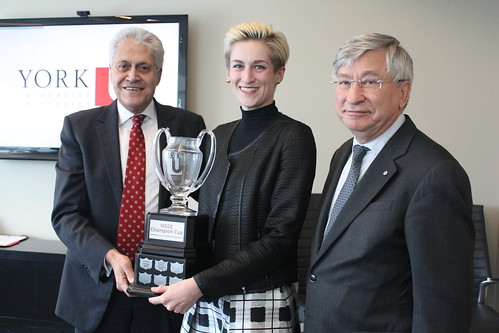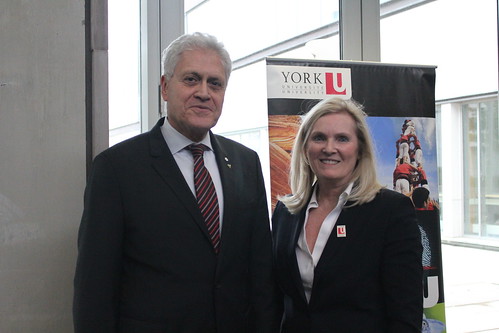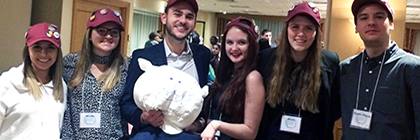For the second time in a row, Schulich School of Business can claim the bragging rights as the NSSE Champion Cup winner.
NSSE, or “Nessie”, is the National Survey of Student Engagement that seeks input from first- and fourth-year York University students. Through NSSE, students are able to contribute their insight and have input into York University’s future direction. The online survey ran Feb. 6 to March 31.
Organizers at York U challenged individual Faculties (except the Faculty of Education and Osgoode Hall Law School) to encourage participation in the survey. The Faculty with the highest participation rate wins the NSSE Champion Cup and bragging rights until the next survey.
President and Vice-Chancellor Mamdouh Shoukri was present to hand out the awards and shared a few thoughts on the importance of student input.
The survey plays a crucial role in steering the University toward a “better learning environment,” he said. He also noted the importance of student opinion with respect to government priorities in post-secondary education, such as funding.

Quick facts about this year’s NSSE:
• Student response rate tabulated at 33.6 per cent (increased from 27.8 per cent in 2014)
• Overall winner of the inter-faculty contest: Schulich School of Business
• Second place: Faculty of Science
• New award: Most improvement over 2014 NSSE: Faculty of Health
• New award: Most creative campaign: School of Arts, Media, Performance and Design (AMPD) with their version of a cute and cuddly blue NSSIE monster walking the halls of AMPD.
• Four participating students were drawn as winners of a $500 tuition waiver: Neekens Marcelin (first-year, biomedical science); Federico Jara (first-year, film production); Carol Singh (environmental studies; fourth-year); and Manal Rahim (law and society, fourth-year, absent from the ceremony)
The online survey, which takes about 15 minutes to complete, allows students in their first and final years of a four-year degree to offer their insight into what York U does well and what it could improve. It will be used to determine how much time and effort students put into educationally rewarding activities and to what degree York University facilitates this involvement.









 Sustainability@York
Sustainability@York






 All French units at York will join forces and collaborate with the Office of Advancement to show that French is alive and well at both our Keele and Glendon campuses, and celebrate the incredible diversity of our Francophone mosaic.
All French units at York will join forces and collaborate with the Office of Advancement to show that French is alive and well at both our Keele and Glendon campuses, and celebrate the incredible diversity of our Francophone mosaic.
 This year’s Glendon team included: Nicole Anichini, Charles-Étienne Lacroix, Kim Poti, Émilie Taillon, Brock Tremblay and Kiera Woodill. In addition to taking the top prize for individual translation into French (Charles-Étienne Lacroix) and individual translation into English (Nicole Anichini), the Glendon team took first place for their translation of a song into French, first in the dreaded “professional simulation” event into English, second for their translation of a song into English, and second for their translation of an advertisement in French.
This year’s Glendon team included: Nicole Anichini, Charles-Étienne Lacroix, Kim Poti, Émilie Taillon, Brock Tremblay and Kiera Woodill. In addition to taking the top prize for individual translation into French (Charles-Étienne Lacroix) and individual translation into English (Nicole Anichini), the Glendon team took first place for their translation of a song into French, first in the dreaded “professional simulation” event into English, second for their translation of a song into English, and second for their translation of an advertisement in French.
 CETA was signed in October 2016, and on Jan. 24, 2017, the deal moved closer to reality after the European Parliament’s Trade Committee approved it. On Feb. 15, the European Parliament adopted the trade deal, which will lead to the provisional application of the agreement as early as April 2017.
CETA was signed in October 2016, and on Jan. 24, 2017, the deal moved closer to reality after the European Parliament’s Trade Committee approved it. On Feb. 15, the European Parliament adopted the trade deal, which will lead to the provisional application of the agreement as early as April 2017.